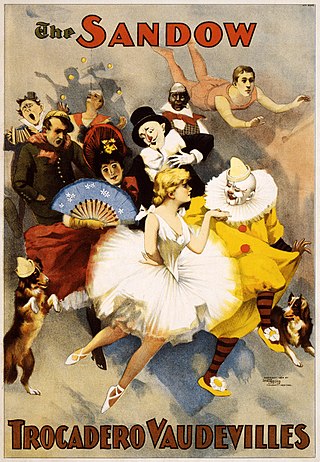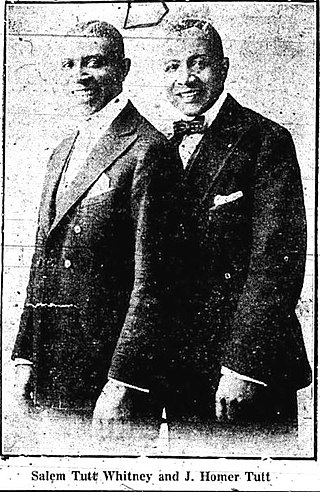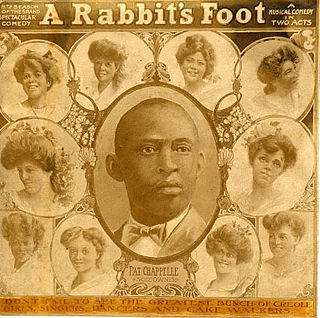Related Research Articles

Vaudeville is a theatrical genre of variety entertainment born in France at the end of the 19th century. A vaudeville was originally a comedy without psychological or moral intentions, based on a comical situation: a dramatic composition or light poetry, interspersed with songs or ballets. It became popular in the United States and Canada from the early 1880s until the early 1930s, but the idea of vaudeville's theatre changed radically from its French antecedent.

Cabell Calloway III was an American singer, songwriter, bandleader, conductor and dancer. He was associated with the Cotton Club in Harlem, where he was a regular performer and became a popular vocalist of the swing era. His niche of mixing jazz and vaudeville won him acclaim during a career that spanned over 65 years.

Ethel Waters was an American singer and actress. Waters frequently performed jazz, swing, and pop music on the Broadway stage and in concerts. She began her career in the 1920s singing blues. Her notable recordings include "Dinah", "Stormy Weather", "Taking a Chance on Love", "Heat Wave", "Supper Time", "Am I Blue?", "Cabin in the Sky", "I'm Coming Virginia", and her version of "His Eye Is on the Sparrow". Waters was the second African American to be nominated for an Academy Award, the first African American to star on her own television show, and the first African-American woman to be nominated for a Primetime Emmy Award.

The Cotton Club was a New York City nightclub from 1923 to 1940. It was located on 142nd Street and Lenox Avenue (1923–1936), then briefly in the midtown Theater District (1936–1940). The club operated during the United States' era of Prohibition and Jim Crow era racial segregation. Black people initially could not patronize the Cotton Club, but the venue featured many of the most popular black entertainers of the era, including musicians Fletcher Henderson, Duke Ellington, Jimmie Lunceford, Chick Webb, Louis Armstrong, Count Basie, Fats Waller, Willie Bryant; vocalists Adelaide Hall, Ethel Waters, Cab Calloway, Bessie Smith, Aida Ward, Avon Long, the Dandridge Sisters, the Will Vodery Choir, The Mills Brothers, Nina Mae McKinney, Billie Holiday, Midge Williams, Lena Horne, and dancers such as Katherine Dunham, Bill Robinson, The Nicholas Brothers, Charles 'Honi' Coles, Leonard Reed, Stepin Fetchit, the Berry Brothers, The Four Step Brothers, Jeni Le Gon and Earl Snakehips Tucker.

Florence Mills, billed as the "Queen of Happiness", was an American cabaret singer, dancer, and comedian.
Theatre Owners Booking Association, or T.O.B.A., was the vaudeville circuit for African American performers in the 1920s. The theaters mostly had white owners, though there were exceptions, including the recently restored Morton Theater in Athens, Georgia, originally operated by "Pinky" Monroe Morton, and Douglass Theatre in Macon, Georgia owned and operated by Charles Henry Douglass. Theater owners booked jazz and blues musicians and singers, comedians, and other performers, including the classically trained, such as operatic soprano Sissieretta Jones, known as "The Black Patti", for black audiences.

Sam Bernard was an English-born American vaudeville comedian who also performed in musical theatre, comic opera and burlesque and appeared in a few silent films.

The Hippodrome Theatre, also called the New York Hippodrome, was a theater in New York City from 1905 to 1939, located on Sixth Avenue between West 43rd and West 44th Streets in the Theater District of Midtown Manhattan. It was called the world's largest theatre by its builders and had a seating capacity of 5,300, with a 100x200ft (30x61m) stage. The theatre had state-of-the-art theatrical technology, including a rising glass water tank.

La Chauve-Souris was the name of a touring revue during the early 1900s. Originating in Moscow and then Paris, and directed by Nikita Balieff, the revue toured the United States, Europe, and South Africa. The show consisted of songs, dances, and sketches, most of which had been originally performed in Russia. The revue was enormously successful in the U.S., and one of its legacies is the popularization of the jaunty tune The Parade of the Wooden Soldiers by Leon Jessel.

Salem Tutt Whitney and J. Homer Tutt, known collectively as the Tutt Brothers, were American vaudeville producers, writers, and performers of the late 19th and early 20th century. They were also known as Whitney & Tutt, Tutt & Whitney and the Whitney Brothers. They were prominent in black vaudeville and created over forty revues for black audiences.

Anita Bush was an African American stage actress and playwright. She founded the Anita Bush All-Colored Dramatic Stock Company in 1915, a pioneering black repertory theatre company that helped gain her the moniker "The Little Mother of Colored Drama".

Black Vaudeville is a term that specifically describes Vaudeville-era African American entertainers and the milieus of dance, music, and theatrical performances they created. Spanning the years between the 1880s and early 1930s, these acts not only brought elements and influences unique to American black culture directly to African Americans but ultimately spread them beyond to both white American society and Europe.

Willie Howard and Eugene Howard, billed as the Howard Brothers, were Silesian-born American vaudeville performers of the first half of the 20th century. They were two of the earliest openly Jewish performers on the American stage.

Nan Halperin was a Russian immigrant to the USA who became a well-known singing comedian. She played in vaudeville at an early age, and later starred in musical comedies on Broadway such as Little Jessie James (1923).

Irvin Colloden Miller was an American actor, playwright, and vaudeville show writer and producer. He was responsible for successful theater shows including Broadway Rastus (1921), Liza (1922), Dinah (1923), which introduced the wildly popular black bottom dance, and Desires of 1927 starring Adelaide Hall. For thirty years he directed the popular review, Brown Skin Models, influenced by the Ziegfeld Follies but exclusively using black performers. "In the 1920s and 1930s, he was arguably the most well-established and successful producer of black musical comedy."
Leonard Harper was a producer, stager, and choreographer in New York City during the Harlem Renaissance in the 1920s and 1930s.
Born in Orange, NJ, Eddie Rector was a famed tap dance artist and master of ceremonies. His career spanned the 1920s-40s as he danced in Harlem, across the US, and in Europe. He is known as a “soft shoe expert,” and he invented the Slap Step. Rector was the protégé of John Leubrie Hill and later danced as a team with Ralph Cooper. He danced in notable revues including Darktown Follies (1914), Tan Town Topics (1926), Blackbirds of 1928, Hot Rhythm (1930), Rhapsody in Black (1931), Blackberries of 1932, and Yeah Man (1932). Eddie Rector died in 1963 at the age of 66.
The Cotton Club Boys were African American chorus line entertainers who, from 1934, performed class act dance routines in musical revues produced by the Cotton Club until 1940, when the club closed, then as part of Cab Calloway's revue on tour through 1942.
Blondie Robinson, also sometimes written as Blondi Robinson, was an African American renowned vaudeville comedic act performer.
Plantation Revue was a 1922 revue put together by Lew Leslie, featuring some of the more popular musical numbers and comedy acts that he had hired at Harlem's Plantation Club.
References
- ↑ Deffaa, Chip (1992). Voices of the Jazz Age: Profiles of Eight Vintage Jazzmen. Urbana: University of Illinois Press. ISBN 0-252-06258-2. OCLC 25499699. page 11
- 1 2 3 4 5 6 7 8 9 10 11 12 13 Peterson, Bernard L. (1993). A Century of Musicals in Black and White: An Encyclopedia of Musical Stage Works By, About, or Involving African Americans. Westport, Conn.: Greenwood Press. ISBN 0-313-06454-7. OCLC 65336150.
- 1 2 "Blondie Robinson collection of African-American Minstrel and Vaudeville photographs (MS.2015.018), Biographical/Historical note." Brown University Library. Riamco.org. Retrieved 16 December 2022.
- ↑ Cullen, Frank; Hackman, Florence; McNeilly, Donald (2007). Vaudeville, Old & New: An Encyclopedia of Variety Performers in America. New York. ISBN 978-0-415-93853-2. OCLC 62430748. Volume 1, pp. 277-8
- ↑ Barker, Clive; Simon Trussler (1994). New Theatre Quarterly 37: Volume 10, Part 1, p. 37. Cambridge University Press, 26 may 1994. Google Books. Retrieved 17 December 2022.
- ↑ Hildebrand, David; Schaaf, Elizabeth M.; Biehl, William (2017). Musical Maryland: A History of Song and Performance from the Colonial Period to the Age of Radio. Baltimore. ISBN 978-1-4214-2240-4. OCLC 1002109162. p. 138